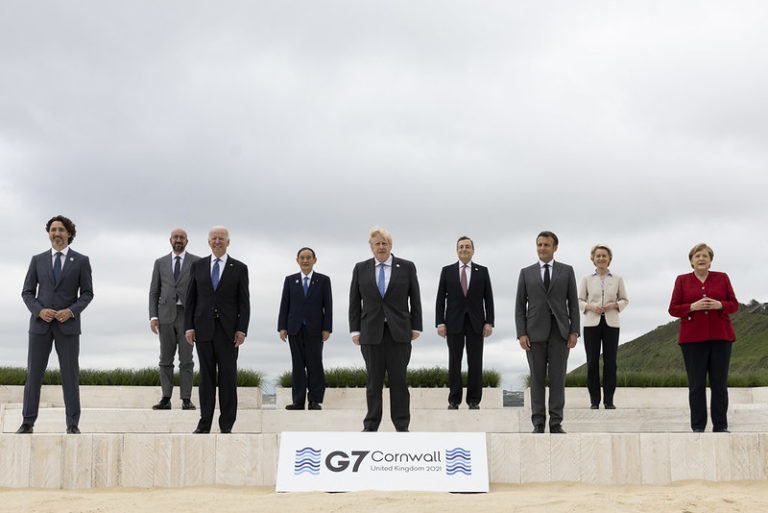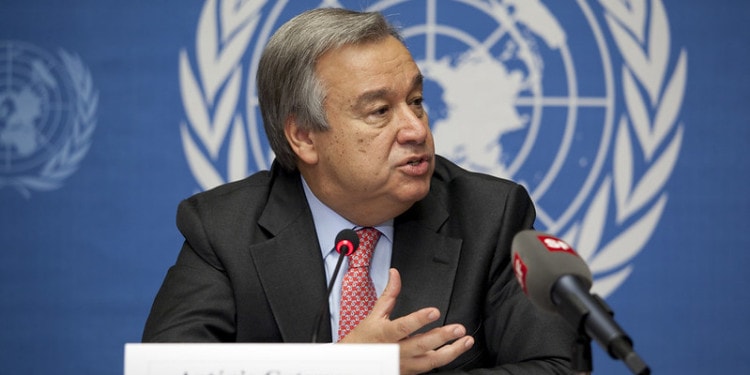To emerge out of the pandemic without having significantly invested into greener economies would be an “unforgivable lost opportunity” for wealthy nations, warns recently re-elected United Nations Secretary-General, Antonio Guterres. Yet, since the pandemic outbreak, the G7 countries have been investing more money in fossil fuels than in clean energy.
In fact, between January 2020 and March 2021, the G7 has committed more than half of their energy-sector funding to fossil fuels: A staggering $189bn compared to only $147bn that went into clean energy. With such significant funding discrepancies, climate campaigners have questioned the earnestness of the green rhetoric perpetually propounded by state leaders worldwide. Considering the present climate crisis, repeated sidestepping of climate commitments shows a lack of urgency among our governments that can no longer be afforded. As IISD writes in a report released last month, “The choices G7 countries make this year will have a critical impact on the direction of the global economy for decades.”
Many world leaders, including British Prime Minister Boris Johnson, and German Chancellor Angela Merkel, have stressed the immediacy of the climate crisis as one that must be prioritized in the COVID-19 recovery. While such sentiments are welcomed, the seven major western economies are yet to act upon their words and deliver the much-required action.
The financial support wealthy economies have directed towards fossil fuel projects in low to middle-income countries is four times the amount that renewable sources of energy have received, according to the IISD report. It is thus fundamentally paramount for political elites to understand that efforts taken that are disproportionate to the pace and velocity at which the climate is changing are simply unacceptable. We can no longer be satisfied with climate-related policies designed to appease the public, which have far too long masqueraded the damages that our governments continue to cause to our climate.
It was a step in the right direction when the G7 had committed to ending the international financing of coal, yet Guterres stresses that much more needs to be done, and imminently so. “I’m more than disappointed, I’m worried about the consequences,” Guterres told the Guardian in an interview. “We need to make sure we reverse the trends, not maintain the trends. It’s now clear we are coming to a point of no return,” Guterres exclaimed.
Every day, we witness the worsening consequences of the climate crisis for communities around the world – farmer’ crops failing; floods and fire engulfing towns and villages,
— Paul Cook, Head of Advocacy at Tearfund.
Fossil fuel costs now exceed that of renewables. The cost-effective value they once had is no more. The relentless subsidizing of fossil fuels has fundamentally disrupted progress towards meeting climate commitments among the world’s leading polluters. A self-regarding strategy employed to provide economic reasons to prolong fossil fuel dependence, governments have managed to artificially drop the costs of exploration, production, transport, and use of fossil fuels at a time when we must turn to renewables. Guterres thus called for a total abandonment of fossil fuel subsidies as “we have to look at the real costs that exist in the economy, which means a price on carbon. If we do these things, many of the investments made to fossil fuels in the recovery phase will obviously not be profitable.”

Failed attempts and excuses to curtail commitments made against fossil fuel subsidies are shockingly numerous. In 2016, the G7 had committed to phasing out “inefficient” fossil fuel subsidies by 2025. Yet with fossil fuel industries continually receiving investments in the billions, achieving such targets has become increasingly improbable. “[This commitment] is critically important to address the climate crisis, but they’ve made it before and failed to follow up with needed action,” said Katherine Rall, senior environment researcher at Human Rights Watch, earlier this month.
Additionally, the U.S., China, and Russia all spent a combined $909bn in support of fossil fuels in 2017, despite establishing aims to eliminate subsidies eight years prior at the G20. EU member states have also extended subsidies for cross-border natural gas projects until the end of 2027, a delay some have charged as a “major policy loophole” that comes into conflict with the bloc climate targets.
The moral responsibilities held among the world’s leading polluters can no longer go unaccounted for. Not only to offset the rise in greenhouse gases but to honour the basic human rights of those residing in developing nations that suffer the brunt of climate disasters largely invoked by the incessant use of fossil fuels elsewhere.
The latest unprecedented heatwave in the American Pacific Northwest is there to prove that time is up, climate change is irrevocably upon us. According to a Human Rights Watch 2020 report, the indigenous people of Canada have seen their access to traditional food sources depleted, with malnutrition intensifying among Colombia’s indigenous children due to a rise in drought occurrences. Such cases are just some examples of the effects of global warming on developed and developing nations alike, which will only continue to accelerate should resolute action be delayed any further.
“By allowing fossil fuel subsidies to continue, G7 countries have been sabotaging their own climate efforts and making it less likely that the world will avoid the most catastrophic human rights consequences of global warming,” says Rall. Such funds should rather be directed towards investing in renewable infrastructure alongside aiding the adaptive efforts of the developing world to withstand the dramatic impacts of the changing climate.
There is a false dichotomy that says adaptation finance can only increase at the expense of mitigation finance. The fact is that we need both,
— Antonio Guterres, World Environment Day statement
These reports encompass a greater issue of climate justice. G7 countries are responsible for almost a quarter of global CO2 emissions despite making up a 10th of the world’s population. Continual abdication of responsibility among the world’s leading polluters has seen those with the smallest carbon footprints suffer the most.
Least Developed Countries are on the front line of the fight against the climate emergency.
I reiterate my call to urgently allocate 50% of total climate finance to adaptation and resilience, which are crucial and must not be the forgotten components of #ClimateAction.
— António Guterres (@antonioguterres) June 19, 2021
In efforts to mitigate the unequal distribution of climate catastrophes, $100bn was pledged from wealthy nations to developing nations by 2020 as part of the historic Paris Agreement in 2015. Yet these pledges have since been left unhonoured, despite the fact that talks may be held to discuss a possible raise for post-2025 at the Cop26.
As Guterres emphasized, without assisting the developing world, effective measures in alleviating the climate crisis may be too big of a hill to climb.

The G7 summit in Cornwall presented an opportunity for the world’s major economies to rebuild trust with the developing world, and whilst there were some positive takeaways, namely heralding the demise of coal, the summit had ultimately left many disappointed.
Related Articles: G7 Summit Results Disappointing: More about China than COVID or Climate Change | G20 Recovery Packages Benefit Fossil Fuels More Than Clean Energy
Previously stated goals and targets were merely reaffirmed, except that the offered funds were insufficient in meeting each country’s own self-proclaimed goals. The initial promise of $100bn a year to help developing nations withstand the impacts of climate breakdown seems ever more distant with bilateral promises of funding lacking detail, clarity, and any prospect of amounting to the initially pledged figure. “Rich countries have so far failed to deliver on climate finance pledges, said Teresa Anderson from Action Aid. “The majority of what has been provided so far has been in the form of loans, which are pushing vulnerable countries further into debt and poverty.”
It was imperative for PM Johnson to have a successful deal on climate finance at the summit for any hopes of a successful Cop26 this coming November in Glasgow. Yet as he was left to re-announce previously allocated donations whilst his allies had refused to stump up funds, Johnson faces an uphill struggle in establishing trust and garnering support for a strong Cop26 deal from the developing world, which, in fact, makes up a majority of the countries at the UN climate talks.
The G7 announcement on climate finance is really peanuts in the face of an existential catastrophe. It really comes as a huge disappointment for impacted and vulnerable countries like Pakistan,
— Malik Amin Aslam, climate minister of Pakistan
Editor’s Note: The opinions expressed here by Impakter.com columnists are their own, not those of Impakter.com. — In the Featured Photo: UN High Commissioner for Refugees António Guterres at a Press Conference in Geneva. Featured Photo Credit: Flickr.










